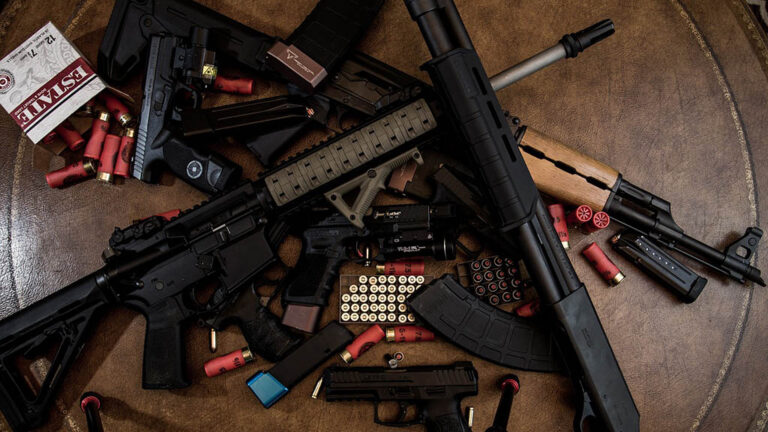Over a billion small and light weapons are circulating around the world, many of which are illegal. The existence of illegal weapons is directly linked to conflict, terrorism, organized crime and violence against women. Now politicians, companies and civil society must work together to reduce the spread of weapons in the world, several debaters write.
575 lost lives. 575 people, there are so many who, on average, lose their lives every day in the world as a result of armed violence caused by small and light weapons. A loss of human life, which affects loved ones and society as a whole.
The uncontrolled flow of small and light weapons has serious consequences. Armed violence and conflict, terrorism and organized crime are directly linked to the existence of illegal weapons. Over one billion small and light weapons circulates around the world, the majority of which are in civilian hands. A large proportion of these are illegal. In addition to loss of life, gun violence causes serious damage. Estimated 2 million people globally living today with physical but caused by these weapons.
Violence against women is increasing
Although men make up the majority of perpetrators and victims, women are very seriously affected by conflicts and the proliferation of weapons. For example, weapons are used to commit gender-based and sexual violence against women. In the home, in what should be a safe place, women are most at risk of threats, injuries and deadly violence, often perpetrated by a family member or partner. The existence of weapons and conflict is clearly linked increased levels of violence against women, where sexual violence and domestic violence become more brutal and deadly according to studies. In 2017, 96 women and girls were murdered worldwide which was the highest number ever since the measurements started in 2004.
Promoting human security and peaceful and sustainable societies requires resolute action to counteract the uncontrolled flow of small and light weapons. Through the adoption of Agenda 2030, UN member states have committed themselves to implementing the global goals for sustainable development, including goal 16 on more peaceful and inclusive societies, where sub-goal 4 highlights the importance of significantly reducing illegal arms flows, and goal 5.2 on the elimination of violence against women.
Through their review, as well as their legislative and opinion-forming functions, parliamentarians have an important role to play in preventing and reducing armed violence, not least in reviewing the implementation of international arms control instruments. The UN Arms Trade Treaty and the UN Program of Action to prevent, combat and eradicate all forms of illicit trade in small arms and light weapons are important legal and political tools in this context.
In addition, women must be fully involved in peace processes at all levels. Women are not only victims of armed violence but are also key players in creating positive change. UN Security Council Resolution 1325 on Women, Peace and Security emphasizes that processes are more sustainable when women are given an active role in conflict prevention and peace-building work; which has also been confirmed by studies. In order not to miss out on women's unique perspectives and valuable contributions, their active participation must be a priority. The fact that only 24% of the world's parliaments are women emphasizes that women must be given a greater role in decision-making processes.
However, the responsibility for creating a more peaceful world where the gender equality perspective permeates the work for sustainable development does not rest solely on the shoulders of politicians. A broad pool of forces and mobilization of actors is necessary, as many small efforts have the potential to lead to a major change. Agenda 2030 in Objective 17 attaches particular importance to global partnerships and cooperation in order to exchange knowledge and expertise and mobilize resources for sustainable development.
Politicians, civil society and companies must take responsibility
As elected representatives, parliamentarians have a responsibility to work for the implementation of international weapons control instruments in the national context in order to create more peaceful societies for the population. Parliamentary knowledge and capacity can be strengthened through increased cooperation with a variety of actors, including civil society, who play an important role in scrutinizing those in power and advancing the voices of citizens.
Civil society is responsible for influencing and holding politicians accountable and can offer specific national, regional and international knowledge about women, peace and security as well as independent and solution-oriented analyzes and methods on issues related to arms control and armed violence.
Responsible companies also have a key role and a responsibility to contribute to more peaceful societies. Innovative partnerships between civil society, politicians and the private sector are an important and often unexplored area that must be prioritized in a broad mobilization for peace and security. One such example is the initiative Humanium Metal by IM where governments, research institutes, civil society and the private sector are united in a joint effort to transform melted-down weapons into peaceful commercial products. The profits are reinvested in the work against gun violence and support for survivors of gun violence.
Partnership is the key to the forward-looking work to prevent armed violence and reduce the proliferation of illegal weapons. Therefore, there is a need for a mutually strengthened partnership between parliamentarians, civil society and the private sector through increased dialogue and knowledge exchange.
To ensure sustainable development for all people - children and adults - we should seek synergies between the efforts of different actors and between international commitments. With joint efforts, we can prevent 575 families from suffering grief at the loss of a loved one every day. Together we can make a difference in achieving peaceful and sustainable societies.
Small and light weapons
Small arms are the weapons that can be used by a person, such as pistols and rifles. The weapons that can be fired by two people, such as grenade launchers or robots are called light weapons. In addition, hand grenades, ammunition and landmines are counted as small and light weapons.

